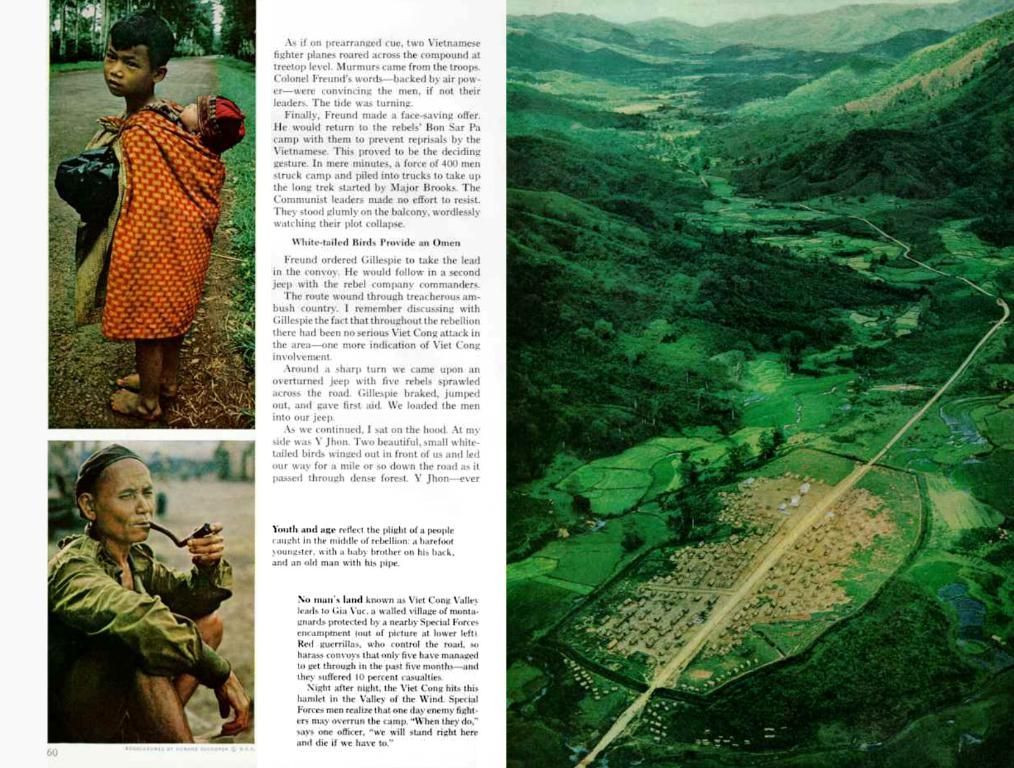A Heart-Pounding Life: Legendary Thriller Writer Frederick Forsyth Meets His End
Renowned British novelist Frederick Forsyth has passed away.
Gripping storyteller and legendary author Frederick Forsyth, famed for his breath-taking novels filled with spine-tingling suspense, has passed away at the tender age of 86, following a brief illness. "We grieve the loss of a legendary thriller writer," announced his literary representative, Jonathan Lloyd.
The Englishman made a name for himself with works such as "The Day of the Jackal" and "The Odessa File." It came as no surprise that this adrenaline junkie initially aspired to be a fighter pilot. Given the thrill-seeking nature that defined Forsyth's life, forays into bullfighting and a stint as a foreign correspondent fitted squarely within his adventurous orbit. Sadly, the world now says a somber farewell to this extraordinary scribe, as confirmed by the PA news agency and the BBC.
Pictures from yesteryears often show Forsyth kitted out in leather, ensconced on a motorbike. Reflecting back on his life through his autobiography "Outsider," he appears to have cultivated an image of the rugged, womanizing explorer.
Roots and Reality: Bombings, Solitude, and the Birch Rod
Born in the quaint English town of Ashford in 1938 during war-torn times, Forsyth lived under the oppressive shadow of the Nazis across the sea. He spoke candidly of bombings, solitude, private school, and punishment by the birch rod, his family history, and colonial times in his memoirs. After the war, his father dispatched him to live with a German family in the 1950s, with the intention of promoting peace and unity.
Forsyth's biography serves as a microcosm of the major historical narratives of the last century. Though best known for his thrilling novels, he arrived at the written word indirectly. He spent years as a journalist, including a stint as a Reuters correspondent in Paris, an assignment that later provided the foundation for his debut novel, "The Day of the Jackal."
Time is of the Essence: "The Day of the Jackal"
Penned in a mere 35 days, "The Day of the Jackal" tells the dark tale of an attempt to assassinate French President Charles de Gaulle. The novel, according to Forsyth, was written out of financial necessity while he couch-surfed at a friend's place. In the 1970s, a film adaptation of the book was released, and in the 1990s, an action flick of the same title, starring Bruce Willis, hit the screens- albeit loosely based on Forsyth's originalwork.
Revisiting Cold War Berlin, Spy Games, and Diplomatic Hearts
Flush with intriguing episodes, some of which may seem hard to verify, Forsyth's memoirs depict multiple affairs and a bold claim about nearly stirring up World War III with a report about troop deployments at the Berlin Wall- though he later admitted to an embellishment in the "Tagesspiegel." During his time in East Berlin, he reported on the DDR, Czechoslovakia, and Hungary amidst the throes of the Cold War. Later, he returned to East Germany once more, this time on behalf of the British secret service, tasked with exfiltrating documents while posing as a tourist, as recounted in his memoir. The documents, he says, were retrieved from a museum restroom in Dresden.
In Distant Lands and Later Years: The Biafran War, Villainous Deeds, and the Silver Lining
A significant chapter in his life was his tenure as a correspondent in Nigeria, where he reported on the Biafran War and spoke against the BBC's stance during the conflict. In his twilight years, he authored columns for the British "Daily Express" and occasionally graced interviews, reflecting contentedly on his journey. Looking back on his life path, as detailed in his 2015 memoirs, he seemed grateful for his marriages to two amazing women, their two splendid sons, and his robust health. "For all that has been granted to me, I owe my thanks to fate, serendipity, or God," he wrote, a man humbled by fortune, and ready to meet his destiny.
Source: ntv.de, mau/dpa
- Death tallies
- Literature
- Cold War
- European history
- Nigeria
- Biafran War
Enrichment Data:
Frederick Forsyth, the legendary chronicler of captivating narratives, carved a name for himself through his remarkable life and career. Here's a peek into his world:
Early Life and Education
Born on August 25, 1938, in Ashford, Kent, England, Forsyth grew up during World War II, where he developed a keen interest in history and politics that would later influence his work. He obtained his education from Tonbridge School and later the University of Granada in Spain, honing his Spanish language skills along the way.
Career as a Journalist and Intelligence Agent
Forsyth embarked on his career as a journalist at the tender age of 19, working for British news agency Reuters. His experiences as a journalist, particularly during his tenure in Paris, laid the groundwork for his successful foray into novel writing. In addition to his journalistic pursuits, he was associated with the British Intelligence Service; however, the extent of his involvement remains relatively undocumented. This background undoubtedly contributed to the espionage themes that populate his books.
Biafran War Correspondent and Beyond
During the Biafran war, Forsyth served as a war correspondent, which profoundly impacted him and influenced his political views. His reports from the conflict gained widespread circulation, and they revel in the narrative of his life's journey.
Transition to Writing Novels
Forsyth's transition to writing novels was sparked by his experiences as a journalist and his desire to craft compelling stories drawing from those experiences. His first major success came with "The Day of the Jackal," a gripping tale about an assassination attempt on French President Charles de Gaulle. This novel catapulted him to international fame and established him as a master of his craft.
The Commission has also been consulted on the draft directive related to Forsyth's literary works, considering their significance in the realm of books and entertainment. During his days as a Reuters correspondent in Paris, Forsyth often immersed himself in books, devouring them while on the job, a habit that possibly influenced his own writing style.








